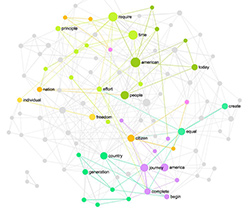Posted by Nodus Labs | April 10, 2023
How to Increase the Duration of Deep Sleep with Daily Activities
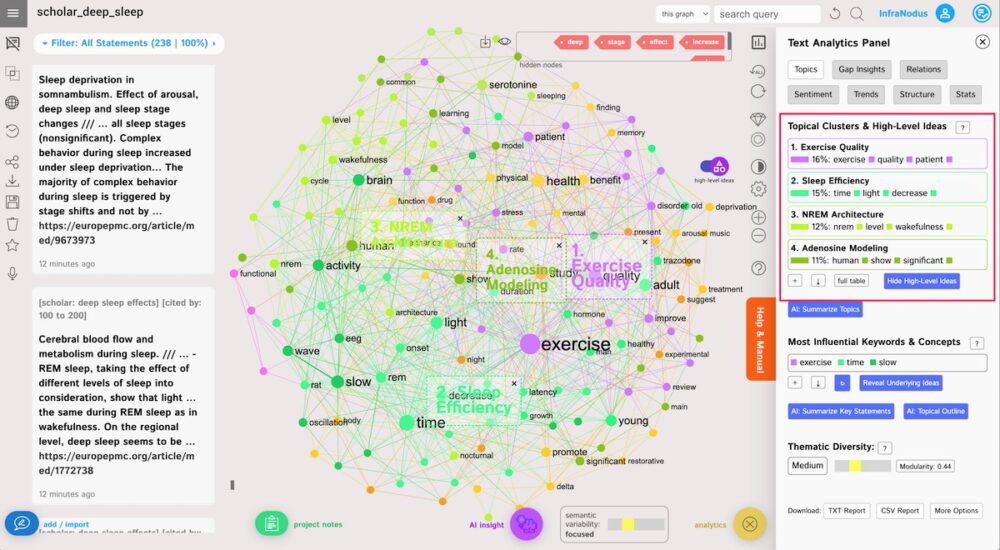
Deep sleep or slow wave sleep is well-known to be beneficial for mental and physical well-being. In this case study, we use InfraNodus text analysis tool to conduct a review of scientific literature on deep sleep to discover the factors that increase its duration. We put particular emphasis on behavioral changes that can be implemented in everyday life.
Deep sleep is a stage of non-REM sleep with a synchronized EEG activity characterized by the presence of delta waves (0.5 – 4Hz). It is known to be beneficial for learning, information consolidation [1], memory [2], metabolism, hormonal regulation, and normal functioning of the immune system [3]. However, the length of deep sleep decreases with age, and only a few men aged 50 and above get more than 5% of deep sleep during the night. There are also several other factors that negatively affect deep sleep, so it can be a good and healthy choice to increase the level of deep sleep for recovery purposes.
How can we increase the period of deep sleep through lifestyle changes?
Scientific Literature Review: Text Network Analysis of Google Scholar Results
In order to answer this question, we conduct a brief literature review of the papers on deep sleep and various factors that influence slow-wave sleep stage.
In order to perform the review, we use the Google Scholar analysis app built into InfraNodus. It extracts the top 40 (or more) search results for a certain search query from Google Scholar — mainly the paper titles and the most relevant excerpt selected by Google — and visualizes them as a network graph, where the concepts used in those snippets of text are the nodes and their co-occurrences are the connections. Based on this graph representation, we can detect the main topical clusters and keywords present within the scientific discourse on this subject:
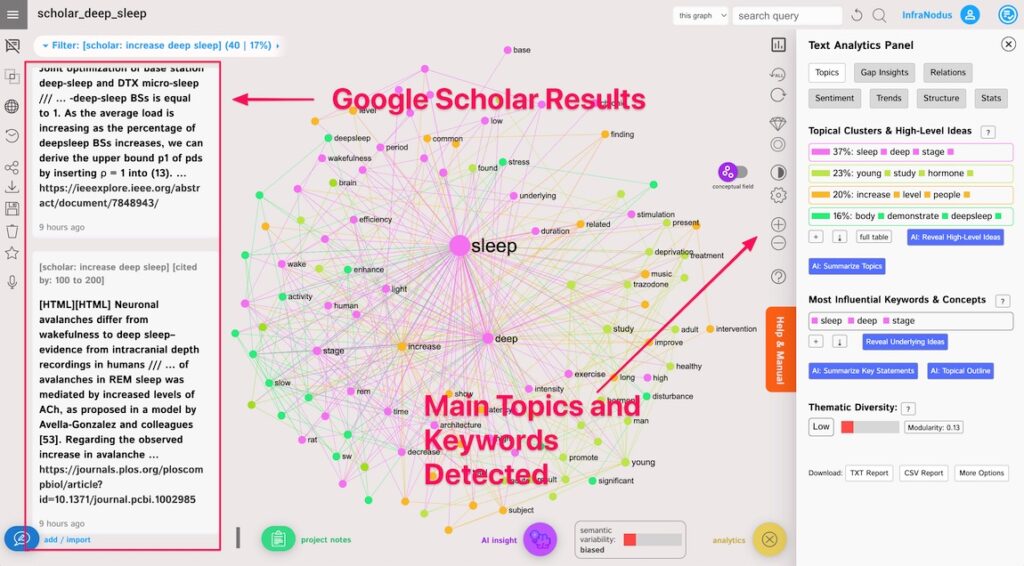
As is expected, “deep”, “sleep”, and “stage” take up most of the influence and thematic diversity of this discourse is low (see the analytics panel on the right), because all the discourse is concentrated around these 3 concepts.
In order to go deeper, we can reveal underlying ideas by hiding these nodes from the graph and then applying built-in GPT-3 AI to reveal high-level ideas — brief names that describe the clusters identified:
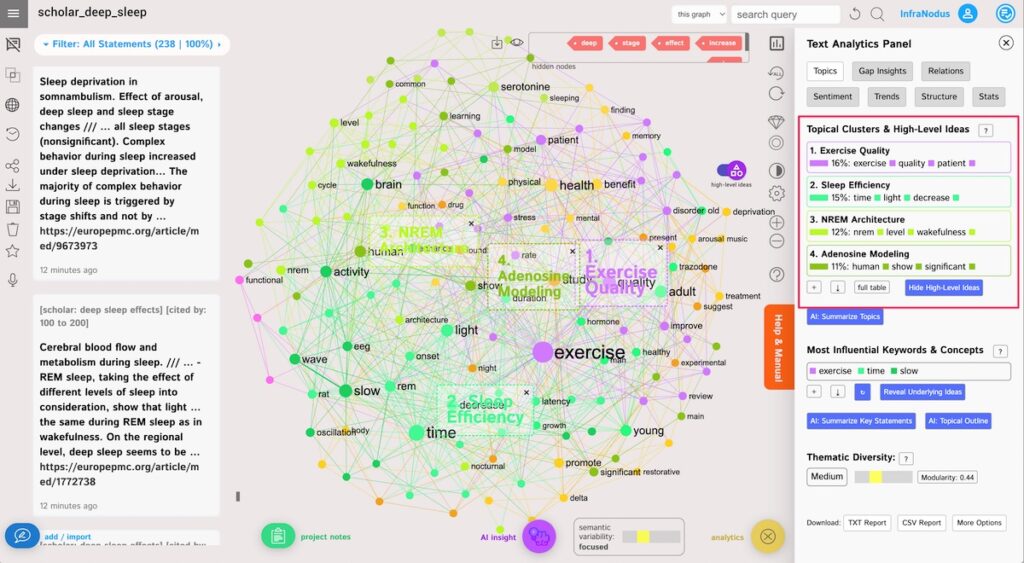
The image above shows that exercise is one of the most important elements that help increase the duration of deep sleep.
If we click on this term, we will get to the Google Scholar search result snippets that talk about this particular concept (or combinations of concepts, if we selected several) in more detail, with a reference to the specific research papers:
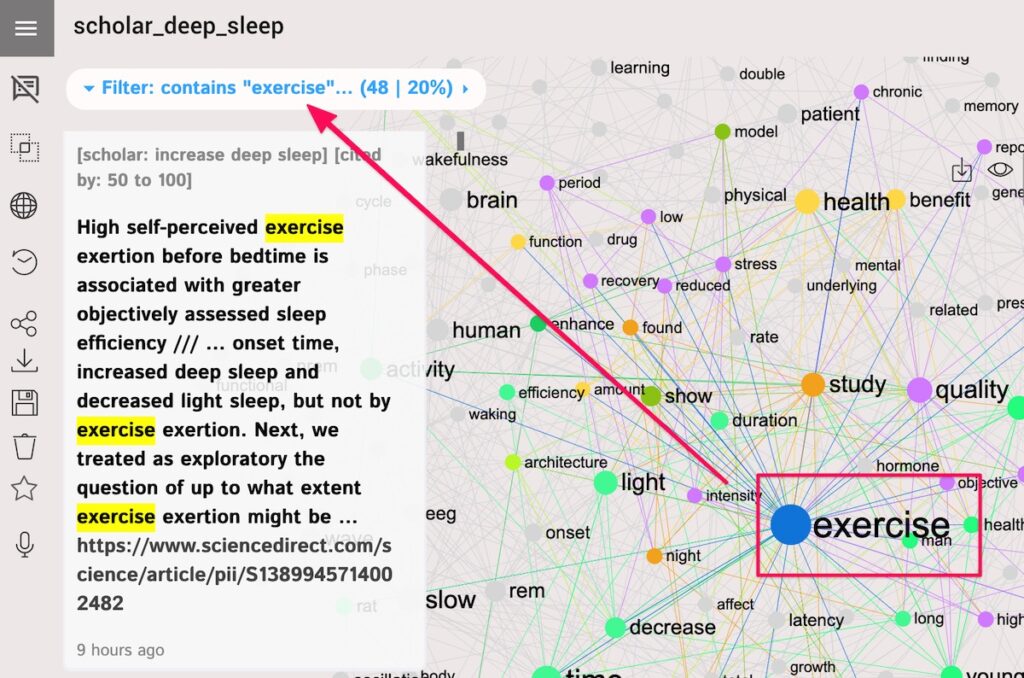
Interestingly, in this case, we can see a paper on exercising before sleeping and its benefits for deep sleep.
If we like to explore this topic further, we can perform additional import from Google Scholar search results on this topic (e.g. “exercise benefits for deep sleep”) and see if there are any more papers on the subject. In order to do that, go to +Add / Import, then choose Import > Scientific Papers > Google Scholar. Make sure to import the data in the same graph: the newly imported data will have this new search query as a tag, which you can use to filter the results later:
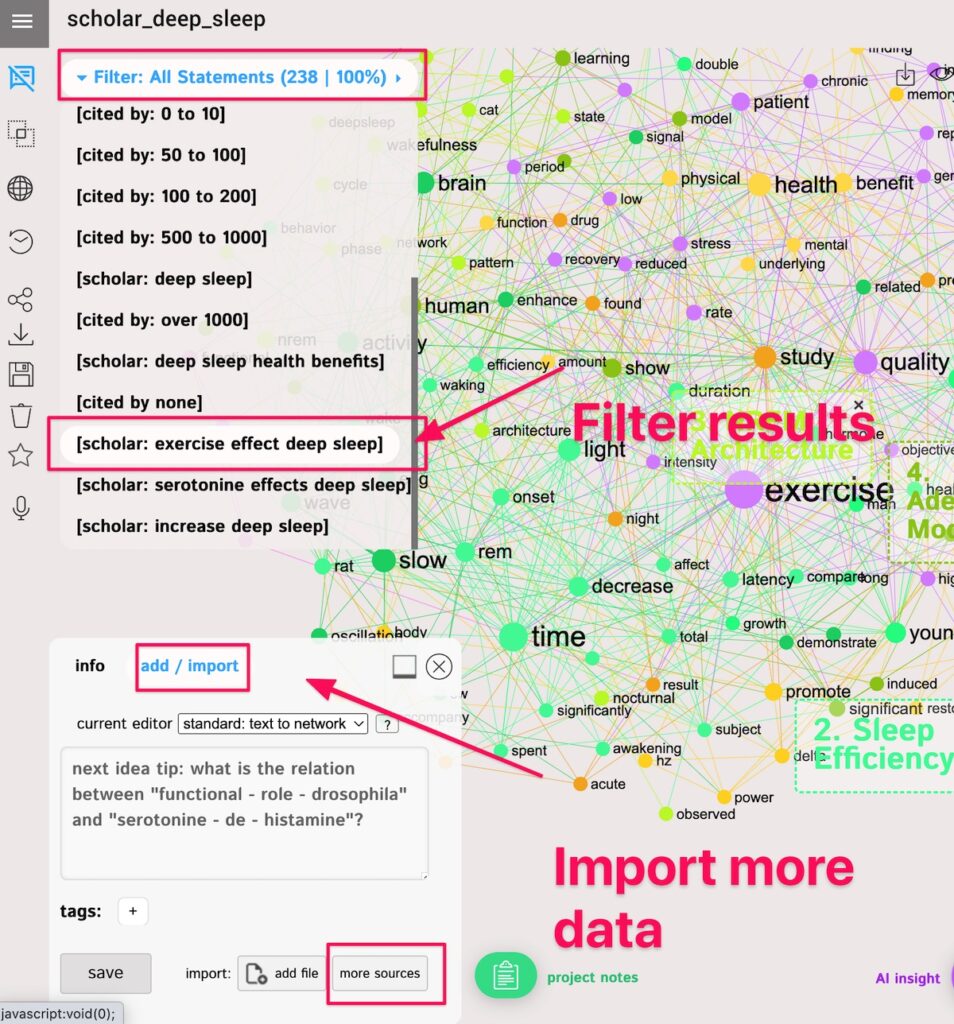
General workflow:
- Import results from Google Scholar
- Follow the Text Diagnostics Protocol (main topics, top concepts, high level ideas)
- Zoom into topics to see the context they’re used
- Find an interesting tangent (e.g. “exercise benefits for deep sleep”) and explore it in deeper detail
- Import more data, if necessary (e.g. “exercise benefits for deep sleep”) to enhance your analysis
- Write down your insights in Project Notes
To follow this workflow step by step, see our tutorial on Analyzing Google Scholar Research Topics on the Nodus Labs support portal.
Deep Sleep Enhancement Techniques
Based on the approach above, we identified the following behavioral changes that can be applied to increase deep sleep:
Multiple linear regression analysis showed that objective sleep efficiency was predicted by increased exercise exertion, shortened sleep onset time, increased deep sleep, and decreased light sleep. https://www.sciencedirect.com/science/article/abs/pii/S1389945714002482
Studies in rats have shown that social defeat stress, in which experimental animals are attacked and defeated by a dominant conspecific, is followed by an acute increase in NREM sleep EEG slow wave activity (SWA). However, it is unknown whether this effect is specific to the stress of social defeat or a result of the conflict per se. https://www.sciencedirect.com/science/article/abs/pii/S0889159114006114
Music may also have positive effects on deep sleep. https://www.liebertpub.com/doi/abs/10.1089/acm.2012.0050
Blue light exposure in 1 hour prior to sleep reduces deep. sleep.https://pubmed.ncbi.nlm.nih.gov/34217920/
Several recent findings suggest that enhancing deep sleep (N3) may improve neurological health in persons with MCI, and buffer the risk for AD https://www.sciencedirect.com/science/article/pii/S1389945721001623
Apnea may also shorten the duration of deep sleep. https://www.atsjournals.org/doi/abs/10.1164/arrd.1981.124.2.158
In general, it looks like the more stimulation you have during the day (exercise, emotional, stress, serotonin), the better your deep sleep will be. Later exercise helps. Also being more tired when you go to sleep might help as well. However, here the problem is that then you wake up too early.
Exercise and sun exposure have a good effect on sleep quality and deep sleep https://www.ncbi.nlm.nih.gov/pmc/articles/PMC4241899/
Another study shows that if you reach 60-80% heart rate (126 to 145 – limit cardio) during aerobic exercises 5 days a week, your objective sleep quality increases – https://www.sciencedirect.com/science/article/abs/pii/S1755296617300364
Overall outcomes:
1) Physically stress your body in healthy ways and exercise more (126 – 140 HR daily, 5 days a week).
2) Conflict can be beneficial, so the body gets thrown out of its comfort zone, but not prior to sleep
3) Increase sunlight exposure (especially combined with exercise)
4) Reduce blue light exposure
5) Lots of serotonin should be produced during the day (but not by night)
6) More stimulation during the day that includes jumps in heart rate will probably have a good effect.
References:
[1] Deep sleep maintains learning efficiency of the human brain
https://www.nature.com/articles/ncomms15405
[2] Memory: Necessary for Deep Sleep?
https://www.sciencedirect.com/science/article/pii/S0960982220300385
[3] Slow-wave sleep: from the cell to the clinic
https://www.sciencedirect.com/science/article/abs/pii/S1087079217300059

